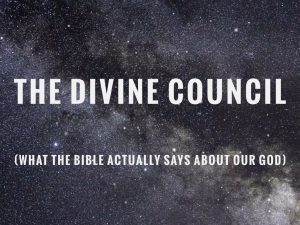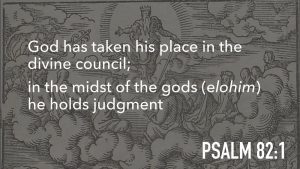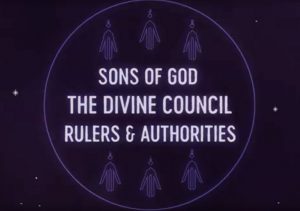Welcome to Day 1451 of our Wisdom-Trek, and thank you for joining me.
I am Guthrie Chamberlain, Your Guide to Wisdom
Shared Rule With The Heavenly Council – Worldview Wednesday
Wisdom – the final frontier to true knowledge. Welcome to Wisdom-Trek! Where our mission is to create a legacy of wisdom, to seek out discernment and insights, to boldly grow where few have chosen to grow before. Hello, my friend, I am Guthrie Chamberlain, your captain on our journey to increase Wisdom and Create a Living Legacy. Thank you for joining us today as we explore wisdom on our 2nd millennium of podcasts. Today is Day 1451 of our Trek, and it is Worldview Wednesday. Creating a Biblical Worldview is essential to have a proper perspective on today’s current events. To establish a Biblical Worldview, you must have a proper understanding of God and His Word. This week, on our Worldview Wednesday episode, we will continue with our study based on a course I recently completed taught by Dr. Michael Heiser. Our study is titled “Sons and Daughters of God: The Believer’s Identity, Calling, and Destiny” Throughout this multi-week course we will demonstrate that, in the Old Testament, “sons of God” and “holy ones” refers to supernatural beings whose Father is God and who work with God to carry out His will and that this divine family was present before humanity. By fully engaging with biblical texts such as Psalm 82; Psalm 89, and Deuteronomy 32:8–9, our study will show that this divine family functions as a template for God’s human family. God desires of humans, as His imagers, to participate in His council. This study addresses issues such as polytheism, the nature of the (little ‘g’) “gods,” and the uniqueness of Yahweh. Within this study, we will apply insights to the New Testament texts and shows how the metaphor of being in God’s family informs our sense of identity and mission as believers.
Shared Rule With The Heavenly Council
· Segment 8: Participation with God’s Government 1
 Participation Not Artificial
Participation Not Artificial
I bring up the issue of predestination really for one reason. That is, I want to make the point that participation in God’s council, participation in carrying out God’s will isn’t artificial. That is, God uses the members of His family to carry out His decrees, and He allows them freedom, creativity, input—however, we want to think about this—in carrying out His will, in getting done the thing, He wants to get done.
Participation is going to be a part of a template for understanding our role in God’s program. Even though it’s sort of a bit of a sidebar, sort of a little bit abstract, it’s essential to include this in our thinking, because when we talk about “participation,” this term is going to come back later in our course when we talk about imaging. The whole concept of being created as God’s imager really matters because God (as we’re going to see) is going to lend us His attributes, one of which is freedom, and He allows us to use those attributes to be who we are in carrying out His decisions.  Not Predetermined
Not Predetermined
Let us consider an example or two of that in the Old Testament, where God and the decisions He makes does not have everything in a predetermined. This mindset is going to matter how we process what we do as God’s servants, as God’s children in His family business, His family bureaucracy. So the question before us is: Isn’t everything predestined? I have already said, tipped my hand here last week, the answer is still no.
Do we have scriptural evidence for that? I’m going to take us on a short detour through 1 Samuel 23 to obtain a needed perspective. This perspective is going to be an ingredient in understanding the importance of actually working with God, being co-laborers in what He wants us to do. It’s not artificial. It’s meaningful; it actually counts. So let’s take a look at 1 Samuel 23.
· Segment 9: Participation with God’s Government 2

Introduction
Let me read through 1 Samuel 23 to get a flavor for this notion about predestination, how God looks at the future. There is going to be an implication in this passage that’s important for us as we, later in the course, think about our participation in God’s program.
First Samuel 23:1–13
So beginning in the first verse of 1 Samuel 23, we read this:
Now they told David, “Behold, the Philistines are fighting against Keilah and are robbing the threshing floors.” Therefore David inquired of the Lord, “Shall I go and attack these Philistines?” And the Lord said to David, “Go and attack the Philistines and save Keilah.” But David’s men said to him, “Behold, we are afraid here in Judah; how much more then if we go to Keilah against the armies of the Philistines?” Then David inquired of the Lord again. And the Lord answered him, “Arise, go down to Keilah, for I will give the Philistines into your hand.” And David and his men went to Keilah and fought with the Philistines and brought away their livestock and struck them with a great blow. So David saved the inhabitants of Keilah.
When Abiathar, the son of Ahimelech had fled to David to Keilah, he had come down with an ephod in his hand. Now it was told Saul that David had come to Keilah. And Saul said, “God has given him into my hand, for he has shut himself in by entering a town that has gates and bars.” And Saul summoned all the people to war, to go down to Keilah, to besiege David and his men. David knew that Saul was plotting harm against him. And he said to Abiathar, the priest, “Bring the ephod here.” Then David said, “O Lord, the God of Israel, your servant has surely heard that Saul seeks to come to Keilah, to destroy the city on my account. Will the men of Keilah surrender me into his hand? Will Saul come down, as your servant has heard? O Lord, the God of Israel, please tell your servant.” And the Lord said, “He will come down.” Then David said, “Will the men of Keilah surrender me and my men into the hand of Saul?” And the Lord said, “They will surrender you.” Then David and his men, who were about six hundred, arose and departed from Keilah, and they went wherever they could go. When Saul was told that David had escaped from Keilah, he gave up the expedition.
Summary of 1 Samuel 23:1–13
Now, do you see the relevance to the predestination question? David is in a jam. Saul was going to come down; he is in the process of coming down to Keilah to encircle the city—classic siege warfare tactics—trapping David inside. And of course, when he does that, he’s just going to say to the men of Keilah, “Look, I am going to sit here as long as it takes. I will starve you out. I will cut off your water supply.” You just do what you do in siege warfare. “Hand David over to me, and nobody gets hurt; I’m gone.”
So David asks, “You know, is this going to happen? Is Saul going to come down and besiege the city? Will the men of Keilah hand me over to Saul?” And God says, “You bet.” He says yes to both things. And so, what happens? David does what you and I would do: he leaves.
Foreknowledge Not Predestination
So, what are the implications? Here’s what we are aiming at: God in this passage foreknew two things that never happened. That tells us that foreknowledge does not necessitate predestination. God foreknows two things that never come to pass. His foreknowledge did not necessitate the predestination of those events because they never happened.
Now, this is going to matter in later weeks when we get into Genesis 1, the fall. Humans are added to the divine family, and God shares His attributes with them, one of which is freedom. When God has His intelligent family members, whether they are divine beings or whether they are human beings, when He tasks them with participating with Him in working out His program, His plan, His will, that’s going to happen in real-time.
What We Do Actually Matters
Yes, God knows what’s going to happen. He knows all things—real and possible. The possible things, at least a lot of them, don’t always happen, even though God foreknows them. So, we again need to learn the lesson here. What God tasks us to do in our time, in our place as His children, as His coworkers, what we do actually matters. We are not robots. Everything is not pre-programmed. We’ll address those thoughts again in subsequent weeks when we talk about imaging.
For now, we need to get back to the nature of God’s family, the other elohim. We know they are not members of the Trinity; we know they are not idols. And we’ve talked about why God doesn’t really need a council, but this is what He uses. So next week, we will go back to some of the other questions and wrap them up.[1]
That will conclude segments 8 and 9 in our study, “Sons and Daughters of God: The Believers Identity, Calling, and Destiny.” Join us again next week as we explore other objections to God’s divine and earthly council. I believe you will find each Worldview Wednesday contains thought-provoking topics to consider as we build our Biblical Worldview.
Tomorrow we will continue with our 3-minute Humor nugget that will provide you with a bit of cheer, which will help you to lighten up and live a rich and satisfying life. So encourage your friends and family to join us and then come along with us tomorrow for another day of ‘Wisdom-Trek, Creating a Legacy.’ If you would like to listen to any of our past 1450 treks or read the Wisdom Journal, they are available at Wisdom-Trek.com. I encourage you to subscribe to Wisdom-Trek on your favorite podcast player so that each day’s trek will be downloaded automatically.
If you would like to listen to any of our past 1450 treks or read the Wisdom Journal, they are available at Wisdom-Trek.com. I encourage you to subscribe to Wisdom-Trek on your favorite podcast player so that each day’s trek will be downloaded automatically.
Thank you so much for allowing me to be your guide, mentor, and, most of all, your friend as I serve you in through this Wisdom-Trek podcast and journal.
As we take this Trek together, let us always:
- Live Abundantly (Fully)
- Love Unconditionally
- Listen Intentionally
- Learn Continuously
- Lend to others Generously
- Lead with Integrity
- Leave a Living Legacy Each Day
I am Guthrie Chamberlain….reminding you to ’Keep Moving Forward,’ ‘Enjoy your Journey,’ and ‘Create a Great Day…Everyday’! See you Tomorrow!
[1] Heiser, M. S. (2019). Sons and Daughters of God: The Believer’s Identity, Calling, and Destiny. Bellingham, WA: Lexham Press.
Leave a Reply